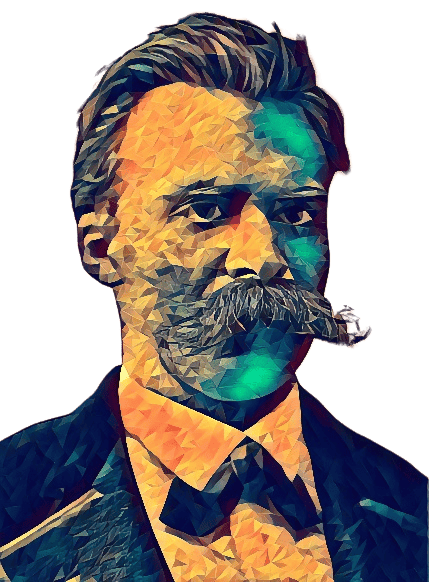Nietzsche on herd mentality
Nietzsche is known for his profound and often controversial insights into human nature and society. Among his many thought-provoking statements, the following quote stands out:
"Madness is rare in the individual; but in groups, parties, nations and epochs it is the rule."
Friedrich Nietzsche
Here, the dynamics between individual and collective psychology are elaborated and we are invited to take a closer look at the behavior of groups and individuals.
Nietzsche's perspective on the psychology of groups compared to that of individuals is a cornerstone of his philosophical thought and is clearly recognizable in many parts of his work. This quote comes from Nietzsche's "Beyond Good and Evil", section 156, where he stated that individuals often behave rationally and reasonably, while the same individuals can act irrationally or even "madly" as part of a group. This dichotomy is crucial to understanding Nietzsche's critique of mass movements and social norms, which he often referred to as herd mentality.
He believed that when individuals become part of a larger group - be it a political party, a nation or a cultural epoch - they often lose some of their independence in thinking and reasoning. This process leads to the adoption of beliefs and behaviors that would be considered unreasonable or unacceptable to the individual.
"The surest way to corrupt the young is to teach them to value like-minded people more than those who think differently"
Friedrich Nietzsche
This statement by Nietzsche further illustrates his attitude towards individuality and group conformity. He paints the picture that the real corruption in a person's thinking occurs when they are encouraged to place conformity above independent thinking. This principle underlines Nietzsche's commitment to critical thinking and the questioning of established norms and values.
The relevance of Nietzsche's insights into group psychology is also important in today's society. At a time when social and political movements are widespread and collective ideologies often dominate public discourse, Nietzsche's words of warning about the potential pitfalls of groupthink and the loss of individual critical thinking are more relevant than ever.
To summarize, Nietzsche's exploration of the differences between individual and group psychology is a powerful reminder of the value of independent thought. His philosophy encourages us to question established norms, think critically and value our individual thinking, especially in the face of overwhelming peer pressure. This timeless message is equally valid in the modern world, urging us to preserve our unique perspectives and ideas in the midst of collective entities. But a word of caution is also in order at this point: we should not stray too far from society, otherwise man cannot exist. Nietzsche was also aware of this, whose concept of the 'superman' involves the idea of overcoming societal norms and expectations, which requires a certain level of engagement with society.

Nietzsche thus recognized the importance of interpersonal relationships and their influence on a person's development. His philosophy states that individuals can challenge their beliefs and grow through interaction with others. However, he emphasized the importance of maintaining personal integrity and one's own thinking during these interactions. It was striking that, despite this awareness, he withdrew enormously from society. If one subscribes to the widespread opinion that the character Zarathustra (see "Thus Spoke Zarathustra..." - Amazon link) actually represented himself, consciously or unconsciously, it can be assumed that he possibly even saw himself outside of society. This was also interpreted by the famous psychologist and founder of analytical psychology Carl Gustav Jung and could have been a decisive reason why Nietzsche fell into madness.







